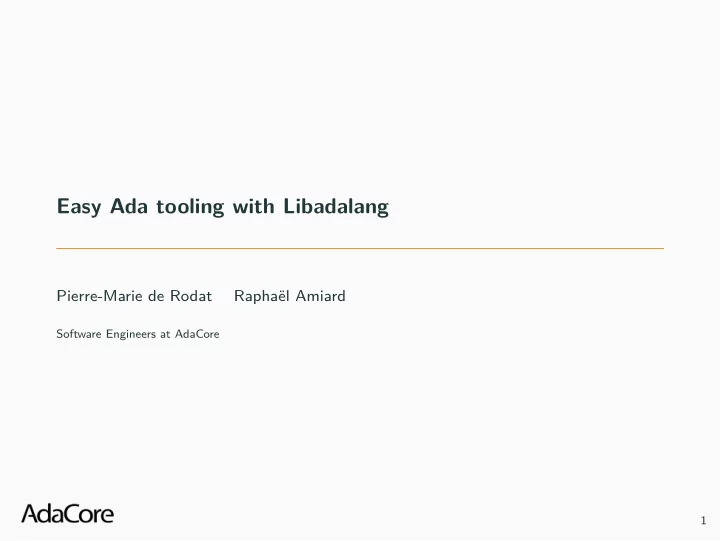

Easy Ada tooling with Libadalang Pierre-Marie de Rodat Raphaël Amiard Software Engineers at AdaCore 1
The need In three bullet points • A library that allows users to query/alter data about Ada sources • Both low & high level APIS: • What is the type of this expression? • How many references to this variable? • Give me the source location of this token • Rename this entity • Etc. • Multi-language: Easy binding generation to other languages/ecosystems • Today: Python, Ada, C • Easy scripting: Be able to create a prototype quickly & interactively 2
The need - IDEs Figure 1: Syntax & block highlighting 3
The need - IDEs Figure 2: Cross references 4
The need - IDEs Figure 3: Refactoring 5
6 The need - command line tools procedure Main is type my_int is new Integer range 1 .. 10; Var : my_int := 12; begin null; end Main; $ ./my_custom_lal_checker main.adb main.adb:2:9: Variable name should start with lowercase letter main.adb:3:4: Type name should start with uppercase letter
Why not ASIS/GNAT? Challenges • Incremental: don’t recompute everything when the code changes • Error recovery: ability to compute partial results on incorrect code • Long running: be able to run for 3 days without crashing your machine GNAT and AdaCore’s ASIS implementation are ill suited to those challenges. 7
Outputs: API Part 1: Tokens 8 -- main.adb procedure Main is null; ctx = lal.AnalysisContext() unit = ctx.get_from_file('main.adb') for token in unit.root.tokens: print 'Token: {}'.format(token) Token: <Token Procedure u'procedure' at 1:1-1:10> Token: <Token Identifier u'Main' at 1:11-1:15> Token: <Token Is u'is' at 1:16-1:18> Token: <Token Null u'null' at 1:19-1:23> Token: <Token Semicolon u';' at 1:23-1:24>
API Part 2: Syntax Outputs: 9 procedure Main is A : Integer := 12; B, C : Integer := 15; begin A := B + C; end Main; for object_decl in unit.root.findall(lal.ObjectDecl): print object_decl.sloc_range, object_decl.text 2:4-2:22 A : Integer := 12; 3:4-3:25 B, C : Integer := 15;
Outputs: API Part 3: Semantic 10 with Ada.Text_IO; use Ada.Text_IO; procedure Main is function Double (I : Integer) return Integer is (I * 2); function Double (I : Float) return Float is (I * 2.0); begin Put_Line (Integer'Image (Double (12))); end Main; double_call = unit.root.find( lambda n: n.is_a(lal.CallExpr) and n.f_name.text == 'Double' ) print double_call.f_name.p_referenced_decl.text function Double (I : Integer) return Integer is (I * 2);
API Part 4: Tree rewriting (not fjnished yet!) Let’s rewrite: Outputs: 11 procedure Main is begin Put_Line ("Hello world"); end Main; call = unit.root.findall(lal.CallExpr) # Find the call diff = ctx.start_rewriting() # Start a rewriting param_diff = diff.get_node(call.f_suffix[0]) # Get the param of the call # Replace the expression of the parameter with a new node param_diff.f_expr = lal.rewriting.StringLiteral('"Bye world"') diff.apply() procedure Main is begin Put_Line ("Bye world"); end Main;
An example 12 import sys import libadalang as lal def check_ident(ident): if ident.text[0].isupper(): print '{}:{}: variable name "{}" should be capitalized'.format( ident.unit.filename, ident.sloc_range.start, ident.text ) ctx = lal.AnalysisContext() for filename in sys.argv[1:]: u = ctx.get_from_file(filename) for d in u.diagnostics: print '{}:{}'.format(filename, d) if u.root: for decl in u.root.findall(lal.ObjectDecl): for ident in decl.f_ids: check_ident(ident)
Technical prototypes/demos 13
Syntax highlighter/Xref explorer Figure 4: Libadalang based highlighter 14
Syntax based static analyzers Those 20 lines of code found 1 bug in GNAT, 3 bugs in CodePeer, and 1 bug in More info on our blog GPS (despite extensive testing and static analysis). 15 def has_same_operands(binop): def same_tokens(left, right): return len(left) == len(right) and all( le.is_equivalent(ri) for le, ri in zip(left, right) ) return same_tokens(list(binop.f_left.tokens), list(binop.f_right.tokens)) def interesting_oper(op): return not op.is_a(lal.OpMult, lal.OpPlus, lal.OpDoubleDot, lal.OpPow, lal.OpConcat)) for b in unit.root.findall(lal.BinOp): if interesting_oper(b.f_op) and has_same_operands(b): print 'Same operands for {} in {}'.format(b, source_file)
Semantic based static analyzers • Very simple and targeted abstract interpretation • Work in progress! Repository here • DSL to specify new checkers 16 with Ada.Text_IO; use Ada.Text_IO; procedure Main is Input : File_Type; begin Open (File => Input, Mode => In_File, Name => "input.txt"); while not End_Of_File (Input) loop declare Line : String := Get_Line (Input); <--- WARNING: File might be closed begin Put_Line (Line); Close (Input); <--- WARNING: File might be closed end; end loop; end Main; https://github.com/AdaCore/lal-checkers
Copy paste detector • Done with Python API too • Very lightweight (few hundreds lines of code) 17 • Full article here: https://blog.adacore.com/ a-usable-copy-paste-detector-in-few-lines-of-python
Applications • Inside Adacore: change semantic engine in GPS, new versions of GNATmetric, GNATStub, GNATpp • Outside: clients using it in production for various needs such as: • Code instrumentation • Automatic refactorings • Generation of serializers/deserializers 18
Conclusion • Come open issues and create pull requests! • API is still a moving target 19 • Sources are on GitHub: https://github.com/AdaCore/libadalang
Recommend
More recommend